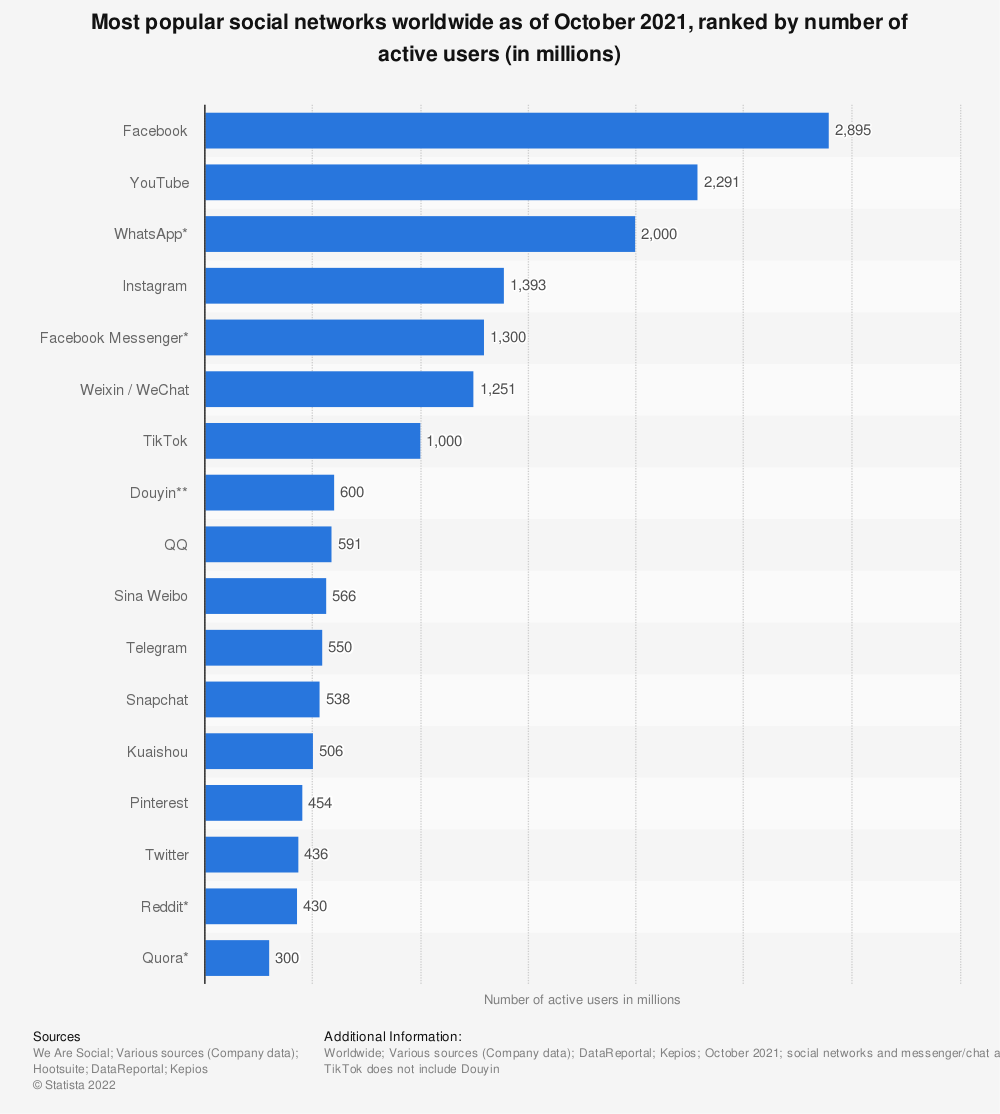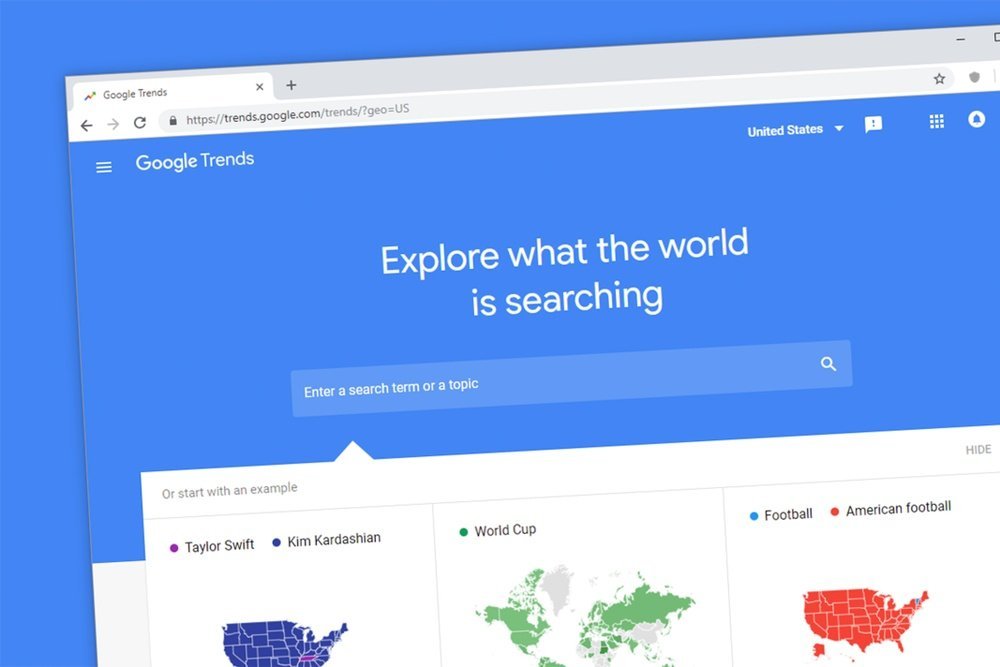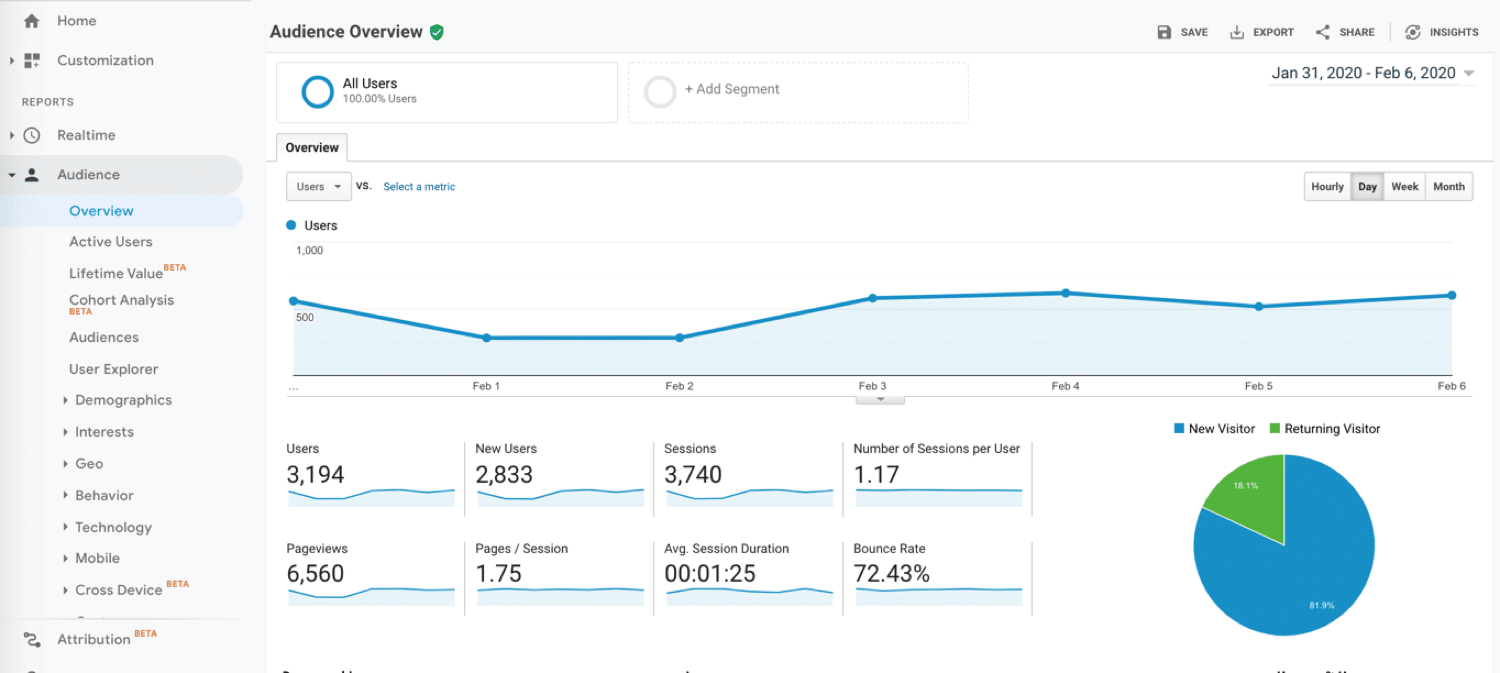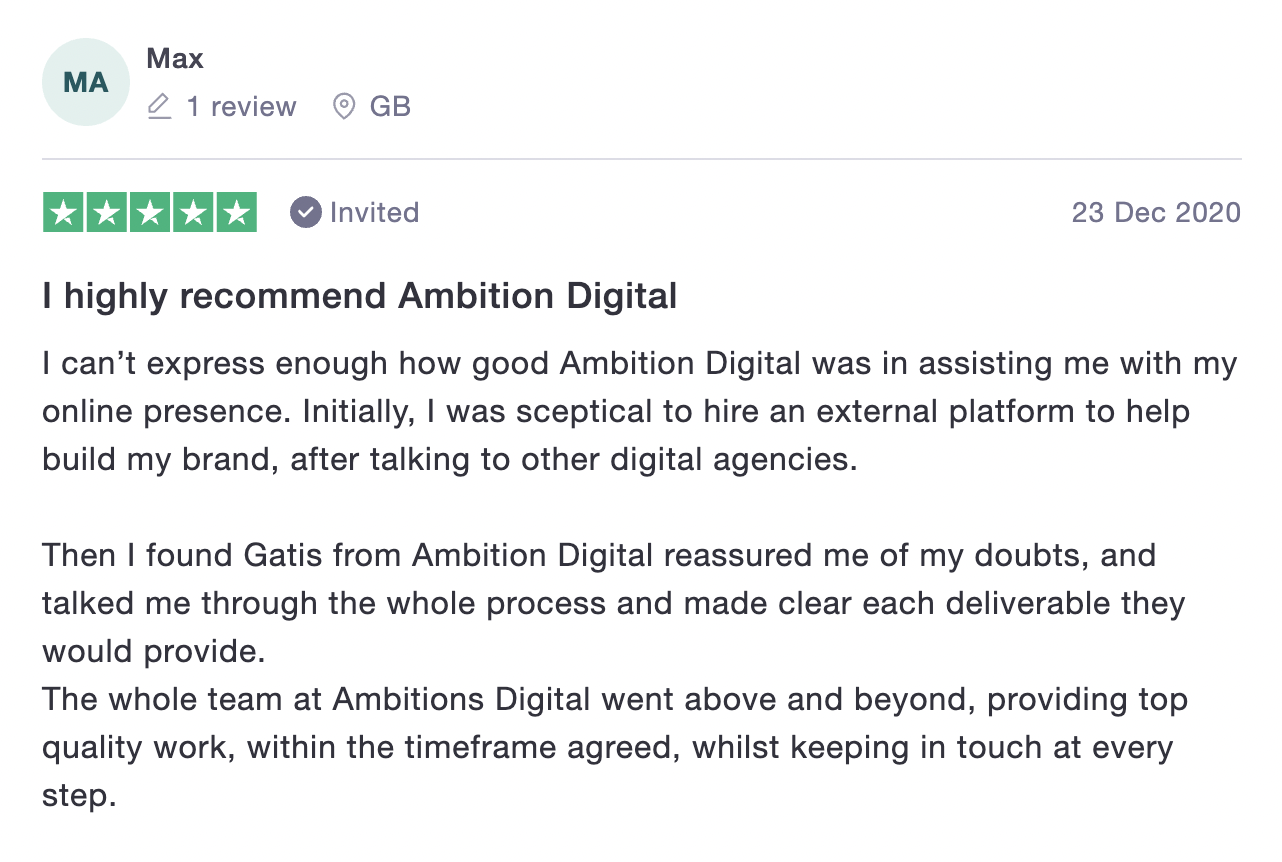Creating a digital marketing strategy means having a broad and diverse plan of action in place to help you achieve your business goals. It can be difficult to get your head around at first because there are so many aspects that need to be considered.
Choosing the right digital strategies and channels will be key to your success. It’s the right way to build a clear digital marketing strategy and stay focused.
A clear-cut plan means that you have identified and considered each aspect of your digital marketing strategy and can now build towards the objectives to drive your business forward.
Having a powerful digital marketing strategy in place will help your business in many ways. It’s an excellent way to help you to reach new customers and grow your brand, as well as increase your leads and sales. You can also use digital marketing strategies to improve customer loyalty, create brand advocates and boost your return on investment (ROI).
But what even is a digital marketing strategy and how do you create one? In this article we’ll cover the strategies of digital marketing, which digital marketing strategies are the most effective, what are some of the best digital marketing tips and how to create your own.
What Are The Strategies of Digital Marketing?
Digital marketing strategies are essential when it comes to growing your business and improving customer loyalty in this day and age. There is a multitude of different digital channels available at our fingertips today that can help us connect with customers in different ways.
There are 8 main strategies of digital marketing that you can use to help you grow your business. Each one of the strategies has its own set of tactics that are helpful in reaching different goals and objectives.
Here is a quick overview of what each digital strategy entails:
Search Engine Optimisation (SEO)
The goal here is to attract customers through search engines by optimising content for keywords to drive more traffic to your website.
With over 5.6 billion Google searches per day, SEO is one of the most effective ways for businesses to reach new customers online. It’s a long term strategy that involves a lot of hard work to achieve results.
Organic search is the largest marketing channel with 53.3% of all website traffic. It drives 1000%+ more traffic than organic social media (BrightEdge).
SEO is one of the digital marketing strategies that you can’t afford not to be using for your business, especially if your goal is to build brand awareness and establish yourself as a leading voice in your industry.
Social Media Marketing (SMM)
SMM is a digital strategy, which entails creating and sharing content on social media channels. The goal here is to create a dialogue with customers and followers, build brand awareness and loyalty, drive traffic to your website and increase sales.
There are many different social media platforms available today that cater to different demographics, so it’s important to choose the right ones for your business.
More than 3.6 billion people use social media worldwide and the number is expected to grow to 4.4 billion by 2025. The most popular social media networks are Facebook, Youtube, WhatsApp and Instagram (Statista).

Email Marketing
Email marketing is one of the most powerful digital strategies out there. It involves sending targeted emails to customers with the goal of increasing sales or leads.
Emails can be personalised and automated, making it an effective way to connect with customers on a one-to-one basis. It’s also a great way to keep in touch with customers and keep them up to date on new products, services or offers.
With 4 billion daily email users it’s no wonder that the scope of email marketing is projected to grow to £13.09 billion ($17.9 billion) by 2027 (Statista).

Content Marketing
Content marketing is the process of creating and publishing valuable content online with the goal of attracting and engaging customers. The type of content can be in the form of blog posts, articles, infographics, videos, images or social media posts.
It’s a great way to position your business as an authority in your industry and drive traffic to your website.
One of the most important factors to consider when it comes to content marketing is to update your old content. More than 50% of companies say this has proven to be the most efficient digital marketing tip implemented (Semrush).
Influencer Marketing
Influencer marketing is a digital marketing strategy which involves partnering with influential people in your industry to promote your brand or product. Since influencers already have an established audience, it’s a great way to increase brand awareness.
It can also prove be a very cost-effective way to reach new customers and drive traffic to your website.
Influencer marketing can work especially great if you’re targeting a younger audience. Consider the fact that 70% of teenagers say they relate to YouTubers more than traditional celebrities and 4 in 10 millennials say their favorite Youtubers understand them better than their friends (Think With Google).

Digital Public Relations (Digital PR)
Digital PR is the process of communicating with customers, press and media to generate interest in your brand or product. You can use digital PR to gain coverage from industry leading publications and build relationships with key journalists.
It’s a great way to position yourself as an expert in your industry and increase exposure for your business.
Digital PR is a very underrated digital marketing strategy with less than 1 in 10 marketers focusing on it. Yet, the vast majority of journalists find their stories through press releases and 54% of journalists in the UK say that press releases are the most trusted source of information (Zazzle Media, Cision, 10 Yetis).
Pay-Per-Click (PPC)
PPC is a digital marketing strategy in which you pay to have your website appear as a sponsored listing on search engines or as display adverts on social media channels and websites. It’s can be a very cost-effective strategy for businesses as you only pay when someone clicks on your advert.
By bidding on keywords that are relevant to your business you can show targeted ads to customers, drive valuable traffic to your website and increase your sales.
But make sure that your website is mobile-friendly, as more than 50% of paid search clicks happen on mobile devices.

Affiliate Marketing
Affiliate marketing is a digital marketing strategy in which you partner with other websites or individuals to promote your product or service. This will help you reach new customers and drive traffic to your website.
In exchange, you will have to pay a commission based on sales or leads generated by their marketing efforts.
It’s easy to understand why more than 80% of all brands offer affiliate programs, as it’s estimated that they generate 15%–30% of all sales for advertisers (Uniqodo).
What Are The Most Effective Digital Marketing Strategies?
The digital marketing strategies that are most effective for businesses will depend on a number of factors, including the size and budget of the business, the long term goals and objectives, industry and sector, level of competition as well as the target audience.
There is no one-size fits all approach when it comes to creating an effective digital marketing strategy, so the first thing you need to do is determine what type of digital marketing will work best for your business.
Once you have a good understanding of your goals and objectives, you can then start to tailor specific digital marketing strategies to achieve them.
Digital marketing is constantly evolving, so it’s important to keep up with the latest trends and changes in order to stay ahead of the competition. Some of the most effective digital marketing strategies that businesses should be using today are pay-per-click (PPC) advertising, email marketing, search engine optimisation (SEO), content marketing and social media marketing (SMM).
How To Create a Digital Marketing Strategy
Creating a digital marketing strategy is a crucial step in any digital marketing campaign. It’s important to map out your goals and objectives before choosing the most effective digital strategies for achieving them. A good strategy will ensure that you have clear direction throughout the process.
Start by asking yourself what you want your digital marketing campaign to achieve. Take some time and thought about this before moving on the next step. You need to have clear goals so that you know if your campaign is successful or not at the end of it. For example, if you want more customers for your business then perhaps email marketing would be an effective digital strategy.
Another thing to think about is why these particular strategies will work well with the goals that you set out at the beginning of this process. A good example might be that search engine optimisation works best when combined with digital PR or social media marketing.
Once you know what digital strategies to use, it’s time to start putting your plan into action. Start with one strategy and work through the process step by step until completion. This will help you learn how all of these different strategies fit together so that you can repeat this success in future projects. Once complete, don’t forget to evaluate your success and make the necessary changes for improvement.
Digital marketing is a constantly evolving field, so it’s important that you keep up with the latest trends if you want to stay ahead of your competition. Here are 10 of the most powerful digital marketing tips you should use to gain an edge over your competitor’s:
1. Conduct Research
The first step when you’re trying to create a digital marketing strategy is to conduct research on the current trends. You need to know how these are going to affect your business. There are plenty of online tools that allow you to track specific data including social media usage, trending topics and popular searches. For example, Google Trends can be used to help give you a better understanding of what’s coming down the line in terms of emerging trends, as well as current trends.
You will also need to conduct competitor analysis. This will not only help with indentifying any existing gaps in their strategy, but also show where the opportunities are for you as well. For example, just because your competitor has moved into producing video content doesn’t mean there’s nothing left for you. See what is working well for them and how you can improve it. Or perhaps you could capitalise on a different aspect, such as live streaming or podcasting?

2. Pick Your Channels
You need to decide on what channels you will be utilising in your digital marketing strategy. It’s important because you don’t bite off more than you can chew. Producing content for too many channels can prove to be very time consuming and resource intensive. Not to mention, not every channel will be suitable for your business. You need to know where your audience is most likely going to be so you can reach them more effectively.
Deciding on what channels you will be using must be done during the research stage. One of the easiest ways you can do this is by checking the channels that your competitors are using.
Target demographic research is also important. For example, the majority of Instagram users are in the ages between 18-34. If that’s your target demographic, then it makes sense to utilise Instagram as one of your marketing channels.
3. Create Engaging Content
Creating engaging and compelling content can be done in the form of writing informative blog posts, creating infographics or producing visual content for your social media. One thing to keep in mind is that whatever content you end up producing, it needs to be high quality and shareable! This way you can add real value for your audience, as well as improve your chances of increasing brand awarness.
You need to make sure that the content you’re producing is actually something that your audience will want to consume. You’ll know when you’ve hit the sweet spot because you’re going to notice an increase in website traffic, social shares and potentially even leads.
Here are some techniques you can use to make sure that happens:
Know your audience
Write blog posts about topics of interest for your target audience. For example “13 Ways to Increase Your Website’s Traffic With Content Marketing“.
Use visual content
Create infographics to compliment your blog content and images and videos for your social media channels. For example “Content Marketing Statistics: The Value of Content Marketing in Numbers“.
Be authentic
Make sure your blog posts and social media contet reflects your brand personality. It’s a good way to stand out from your competitors.
Keep it short
Most people only read the first few sentences — especially when browsing on a mobile phone. You don’t have to write long content, especially on social media — just include your main points or unique selling proposition (USP).
Link to other content
Don’t be afraid to include links to other relevant content and websites that would be helpful or beneficial to your audience.
Summarise your points
Use bullet points or short paragraphs to summarise your key points and important information. This makes it easier for your audience to understand the message.
Collaborate with influencers
Use influencer marketing or reach out to other experts in your field. They’re often looking for similar opportunities too!
4. Use Remarketing Tactics
Remarketing is a subtle way to let your visitors know that you’ve noticed them. You can use free marketing tools like Google Analytics to know when someone visits your website, where they have come from, what pages they are visiting and where they are clicking.
If you run an eCommerce website you can even find out when a customer has added items to the cart, but then left the website. This would be a perfect opportunity to remarket to them, by reaching out to them through email or using paid advertising. You can then move them further through your marketing funnel by offering them an incentive, such as a discount code to eventually convert them.

5. Build Your Online Reputation
If you want your business to succeed online, you have to manage your online reputation. Nowadays, it’s easier than ever for your customers to leave feedback on your products or services. You need to make sure that you stay on top of what your customers are saying and respond to them accordingly. If you get a negative review online and you don’t respond it can be very detrimental to your business and reputation.
Here are some tips on how to manage your online reputation to make sure it remains in good order:
Don’t ignore feedback
Respond quickly and courteously when customers have questions about their order or service experience.
Keep track of your brand mentions
Stay on top of what people are saying about your business or brand by regulary monitoring social media channels, search engine results, blogs, forums and review platforms.
Be honest with yourself
If your competitor reviews seem better than yours, then it might be time reevaluate your strategy to see how you can improve customer satisfaction levels.
Ask for reviews
Encourage your happy customers to leave you a review or share it with friends and family, so you can expand your reach and improve brand awareness.
Don’t ignore negative reviews
Do not be afraid to use negative feedback as an opportunity for improvement. The most important thing is to not ignore it and always respond courteously.
Remain professional
Avoid personal attacks or lengthy arguments when responding online — if someone has a genuine complaint that requires more than one response (i.e. refund request), offer them the option of sending you an email or DM instead.
Stick to your policies
Be patient in dealing with unhappy customers who are looking for instant gratification, because things will turn around eventually. Just focus on doing what is right, rather than taking shortcuts by playing into customers demands or making deals outside of your company policies.

6. Optimise For Mobile
These days your website absolutely needs to be optimised for mobile devices. Mobile marketing will continue to be one of the top digital marketing trends in 2022.
Your site will need to be modern and responsive on every type of device (smart phone, tablet and desktop) in order to provide a good experience for your visitors. As more consumers visit your website through their phones rather than their computers, it is imperative that your site is responsive so that visitors have a good experience when trying to find information, reach out to you or make a purchase.
To put it simply, a responsive website ensures that the visitor has a good experience, no matter what type of device they’re using.
In 2020, the number of unique mobile internet users stood at 4.28 billion, indicating that over 90 percent of the global internet population uses a mobile device to go online. So, make sure your site is optimised for mobile devices!
7. Collaborate With Influencers
Influencer marketing still remains one of the most effective customer acquisition strategies and should be considered as a potential channel in any digital marketing strategy. Collaborating with influencers can be a great way to help promote your product and increase brand awareness. People trust people more than they trust companies. In fact, according to statistics around 74% of consumers trust social networks to guide their purchasing decisions.
You might also find that collaborating with influencers will open doors for opportunities you wouldn’t normally have on your own. Good influencers are often very aware of what their followers like and their audience is highly engaged.
8. Make Use Of SEO
When it comes to creating a powerful digital marketing strategy, SEO is one of the most important aspects to consider. With more than 2 trillion Google searches per year, it’s one of the best ways to get your brand out there. People are actively searching for services and products like yours. If you’re able to rank higher than your competition, you will benefit from of all that organic search traffic.
But with so many different ranking factors and competition out there, you will need a powerful SEO strategy to compete. Start by doing some keyword research to find valuable keywords that relate to your brand or product.

9. Set Your Budget
The bottom line is that most of the time your digital marketing strategy will only be as good as your budget permits. For SEO, you’re very unlikely to be able to rank for high-volume/high-competition keywords like “car insurance” if you’re only spending £100 per month.
On the content creation side, you might need to hire writers, graphic designers, social media content curators and video editors. The costs can really start to add up, so you setting your budget is one of the first steps you need to take before you start developing your digital marketing strategy.
If you plan on doing pay-per-click (PPC) advertising, you will also need to set a campaign budget and create a marketing funnel that will help you make the most of it.
10. Create a Content Calendar
Consistency is key. Once you know what type of content you will be making, you will also need to create a content calendar. This will allow you to plan ahead and know exactly when you’re going to post what. Typically you would develop a content calendar with a 3 to 6 month plan.
You can even plan as far ahead as 12 months in advance. This might seem like overkill, but when it comes to creating a digital marketing strategy — planning is everything. Planning 12 months ahead allows you to have enough time to consider and implement any changes or amendments that you might have to make and which direction you should go with future posts or campaigns.
BONUS: Determine Your KPIs
Before you start creating content, it’s a good idea to determine what the key performance indicators (KPIs) are for your SEO strategy.
These can be anything from increasing sales to how many new followers you’ve gained on social media. Knowing these numbers will help guide and shape the creation of your marketing strategy.
Some of the most important KPI’s you need to consider for a data-drive digital marketing strategy are:
- Web Traffic Sources
- Brand Awareness
- Cost Per Lead
- Website Traffic Leads
- Returning Visitors
- Conversion Rates
- Cick Through Rate (CTR)
In Conclusion
When it comes to creating a powerful digital marketing strategy, there is no cookie-cutter approach. Every business is unique and has a different set of goals and objectives. With that being said, there are some universal best practices that will help you develop a digital marketing strategy.
Focus on your visitors and customers first, create content to meet their needs and adds real value, and stay up-to-date with the latest trends. This way, you’ll be able to develop the most effective digital marketing strategy for your business.
The key to success is understanding what metrics are important in order to measure the effectiveness of your digital marketing efforts — then work backwards with that data to get a better idea of how often and where you should post. Consider different advertising methods that might work for your brand, such as video advertising or sponsored posts. Then, use all that data to create an actionable plan.
At Ambition Digital, we’re a 5-star rated digital marketing agency with years of experience in creating digital marketing strategies for commercial clients. Our team of experts can help you create and implement a powerful digital marketing strategy that drives results for your business and helps you grow.
If you need help with your digital marketing strategy, contact us today to see how our team of experts can help your business.









